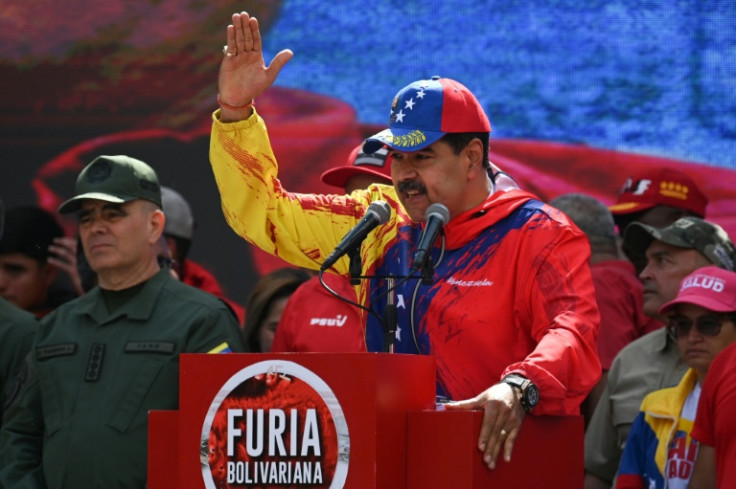
Venezuela's hotly contested elections are just days away. As tensions across the country loom large with hopes of a new commander in chief taking power, President Nicolas Maduro seems to be struggling to maintain the support of the armed forces, a traditional arbiter of political disputes in the country.
At crossroads all over Venezuela, young men and women wearing their faded green uniforms stop vehicles returning from a rally for Maduro's opponents asking for identification and inspecting their vehicles.
Aiming to intimidate voters and occasionally detain government critics, these somewhat arbitrary stops often involve a request for a ride, bananas or "collaborations"— Venezuela's euphemism for a small bribe— a new report by the Associated Press reveals.
However, these efforts often fall flat, as support for Maduro and his party has quietly slipped away, with many officers hoping for a new party to take the helm of the country.
"Did the lady arrive? Were there a lot of people?" one soldier asked about opposition leader Maria Corina Machado.
"We wanted to watch, but there is no Wi-Fi here," another whispered to the Associated Press.
The armed forces have been an integral part of Maduro's grip on power ever since his mentor and predecessor, former tank commander Hugo Chavez, led an uprising against an unpopular austerity government in 1992, AP News explains. When Chavez was elected president in 1998, he purged officers indoctrinated in the U.S. to fight communism, placed fellow coup plotters in top positions and poured the country's oil wealth into fighter jets and expensive military hardware.
Maduro, without Chavez's military background, has nonetheless empowered his own crop of uniformed allies, many of whom, like the president, face allegations of corruption and human rights abuses.
The top ranking officers have mainly remained loyal with Maduro, delving deep into political mudsliding.
For instance, Gen. Domingo Hernandez Larez, the head of the joint chiefs of staff, posted a photo on social media where Machado was seen speaking in front of a white board scribbled with notes calling for the "elimination" of the armed forces. Since then, Machado has called the accusation "fake news," to which a media watchdog group agreed and maintained that the image was manipulated.
Nevertheless, other rank-and-file, as well as low-tiered officers have expressed their discontent with the party, said William Brownfield, a former U.S. Ambassador to Venezuela and senior fellow at the Wilson Center in Washington.
One of the reasons for this is the country's crashing economy. Between 2012 and 2020, the Venezuelan economy has shrunk 71%, while inflation remains at a whopping 130,000%. This has led cash bonuses and perks awarded to military families to decrease dramatically.
So much so that their oftentimes public discontent has led the government to punish those who step out of line. In fact, members of the armed forces make up about half of the 301 Maduro opponents currently imprisoned and classified as political prisoners by Caracas-based legal assistance cooperative Foro Penal.
But while a full blown military rebellion is not expected ahead of the elections on July 28, some hope of justice remains on one General— Vladimir Padrino Lopez.
Padrino is seen as some sort of white knight by many Venezuelans. The 61-year-old is one of the last Venezuelan officers trained in the U.S. before Chavez shifted Venezuela's alliances toward Russia, China and Iran. In 2015, he appeared on state TV to recognize the sweep by the opposition in parliamentary elections well before Maduro acknowledged defeat.
"If there's an avalanche of people in the streets supporting the opposition, there's going to be a lot of pressure on Padrino," said Gen. Rodolfo Camacho, a Maduro opponent who writes a report on military affairs, and who worked with Padrino before being charged with plotting against Maduro's government and fleeing Venezuela. "He is the one small hope I have left."
© 2024 Latin Times. All rights reserved. Do not reproduce without permission.







